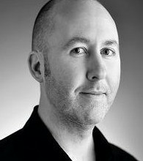SFX's Nick Setchfield talks to Ashes co-creator Matthew Graham about the mind-bending finale
So it’s all over. The Quattro is trashed, Gene Hunt’s cosmic secret is revealed and The Railway Arms is officially the greatest boozer in the universe. Time to talk exclusively to Ashes To Ashes co-creator Matthew Graham about the revelatory conclusion to the saga of the Gene Genie…
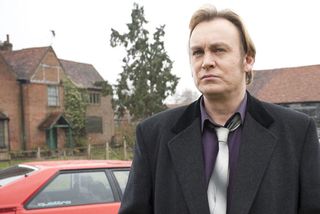
SFX: How much pressure did you feel to deliver a satisfying ending – and is that ever a healthy pressure for the creative process?
Matthew Graham : “A huge amount of pressure to deliver a satisfying ending – and to be satisfying emotionally was our main concern. There are two things that go on with Ashes and its fans: one, the actual mystery that we’re interested in, which is a few quite simple questions – who is Gene Hunt? What is this world? Are Ray, Chris and Shaz invested in the same way, or in a different way, to Alex? And is Alex going to get home? And the extra question we add in series three is ‘Who’s Jim Keats, and what’s his agenda?’ And those are the only things that we’ve ever fully concerned ourselves with, apart from how it all ties in with the Sam Tyler story, of course.
“But then there’s this whole other layer of things that we were planting not as red herrings necessarily, but as fun little things that don’t really go anywhere. And the fans extrapolate all sorts of extra mysteries on top of that. I’ve been through the stage – and I’m out the other side now – of being worried that we were underselling the answers in the last episode. My worry was that people were going to say ‘But there was so much more that I imagined, so many more clues and mysteries that I was convinced were going to be important – you’ve sold me short.’ That was my worry. But what I felt very strongly was that we were writing for a very big audience, a very broad audience, and we weren’t writing a niche fan show. It’s not a cult show.
“And so it was really important that the big questions were answered, and that the whole thing had a satisfying conclusion. But I now look at it and I think well, there are things in there that people maybe aren’t expecting, like the fact that Gene is only 22 years old, which I’m hoping will still come as a surprise. And even though people may suspect that Keats is evil, when you actually see him unmasked he’s so bonkers, so clearly hellish and mad that it surprises you. So yes, there was pressure, and I was writing with that in mind to some degree. But when you start writing you stop feeling scared. That nervousness just seems to go away, like stage fright. You just get on with what you want to do.”
So did you follow any of those crazy fan theories, and did they feed back in any way into your vision of the show?
“I tried not to go onto the fan forums. We did during Life On Mars a bit, but as Ashes picked up a head of steam round about series two Ashley [Pharoah, co-creator] and I stopped going into those places, partly because I don’t think it’s helpful for us to be there. I don’t think it does us any favours. And it’s a clamour of ideas from all sorts of places, often posted by very young people who are very passionate but not very articulate, so you end up misreading a lot of what you’re reading. People will say things like ‘Why can’t Alex just kiss Gene?!’ and you can misread that as someone being aggressively critical, when actually they’re just being excited. It doesn’t help us, and when you then feel the need to respond in those fan sites it doesn’t help them. Because then they feel they’re being monitored and observed. They think they want you there, and initially they’re very excited that you are there, but then very quickly they’re not, and very quickly they’re a bit intimidated. So I’ve kept out of them to a large degree, but yes, some of the more extreme theories have filtered through. It sounds patronising, but to those people I would tend to say ‘You don’t know what’s good for you. You think you want something that extreme, but I don’t think you do, because when it arrives it would seem very strange and unsatisfying.’ An example would be the end of the US Life On Mars. Have you seen it? It beggars belief, doesn’t it?”
Did you keep your ending secret from the people making that American version?
“Yes, we did! We talked generally with them about what we were trying to do, and what we felt the world was. We told them that we thought the world was an afterlife, a purgatory for coppers. They thought that wasn’t extreme enough. It tickled their fancy, but they said ‘Oh guys, we’ve got something more extreme than that – we’ve got something that will blow you away! You’ll never see it coming!’ So we thought ‘How exciting, but just to sound a note of caution, endings that you never see coming are not necessarily good endings.’ I think the point about the ending of Ashes is that you should be able to see it coming. If you don’t, that’s fine, but it’s not out of nowhere – everything is building to this, rather than us coming up with something and going ‘Hey-hey, you never knew this, but Gene is a Martian!’ And that was their mistake, I think.”
I guess it should be like one of those really great episodes of The Twilight Zone, where you slowly begin to suspect the shape of this world…
“Yes, I think that’s better. And the best M Night Shyamalan films are based around that. And the worst ones aren’t.”

So when you created Life On Mars did you have a long-term gameplan in mind? And is this the ending you always had planned?
“Bits of it are. When we got to the end of Mars we planned to do a third series, as you know. In the third series of Mars we would see Sam realising that he was dead – he knows he’s dead at the end of series two, but in series three he would start to believe that he could cheat a final death. He thinks that’s Heaven, and gradually it would dawn on him that this wasn’t Heaven. So it was going to be all the back story that we have in Ashes, of Sam saying ‘I don’t want to leave here’, and we would learn more about Gene, that Gene was actually this young copper. Because we were never able to do that third series, when we came to Ashes we thought let’s start again, let’s not rush to get to that conclusion. Obviously the BBC didn’t want just one series of Ashes, so we said right upfront to the Beeb we’d like to do three series – we’d like to start frivolous, and get darker as we go. And, amazingly, they said ok, let’s give it a go. And luckily the first series did well enough to get a second series and so on, so we were able to do that.
“The only thing that came in completely brand new was Keats – I created Jim Keats just for episode one, just to tie up the whole idea that Gene could shoot someone, go on the run and then just walk back in and say ‘Right, I’m picking up where I left off.’ And I thought it would be quite fun to do a story-of-the-week with a Guy Pearce LA Confidential type character who Gene runs rings around. Maybe tie that up as a little sub-story at the end of episode two. And I wrote the script like that. But then we talked about the problem of what we felt was missing in series three that made it different. And we all agreed that we missed the motor of a Supermac [the corrupt copper in series two], we missed a character who was an on-site regular nemesis, who wasn’t part of the gang but who added something. So I came up with the idea of what if Jim Keats says ‘I’m going to stick around’? Then we started talking more about Jim and we thought oh, let’s just do it. Let’s just make him the Anti-Christ or the Devil and make him evil. And he’s going to try and take Ray, Chris and Shaz and even Alex away from Gene. So that suddenly gave the series a massive engine that it needed. And it gave us the shape of the series, so it meant we could start focusing on the other characters and get to know them more.”
When the characters saw stars you did seem to be teasing us that they were going to be in space, on a ‘gene hunt’, just like the American show. Was that just you being completely evil?
“[laughs] There was a line in episode five where Ray sees the stars and he says ‘It’s like we’re some kind of astronauts’ – and I remember telling you that there’s a line coming up that will send your blood cold! And I knew there would be a group of people out there going ‘Oh no, f---! Please don’t do that!’ And so when that line went in it was very much a cheeky ‘let’s worry people’ bit!”
How did the cast respond when you broke the revelation to them? Was it a hard sell to Philip Glenister, for instance?
“No, I don’t think it was. Actors never mind being told that they represent the gateway to eternity! And they never mind being told that they’re playing Satan… It was fine with Keeley and Phil and the others, because they’d all been trying to work out where it was going themselves. And we were pleased that they all liked it but were also surprised, and that they hadn’t extrapolated that ending for themselves. So that gave us encouragement. With Danny [Mays, alias Jim Keats], we took him to one side before filming and said ‘You’re going to be on the subs bench quite a lot in this series, and there’s a reason for that, because somewhere around the second half of the run you’re going to start revealing your hand. By the end of the series you’re going to be beating the shit out of Gene, and you’re going to be evil incarnate.’ And he said ‘Great, bring it on – that’s all I need to know.’”
So why was Gene required to play his role?
“Why is he the gatekeeper for coppers? What the script tries to imply, without being too explicit – because I think if you become too explicit it starts to become naff – is that he’s kind of taken the role on himself. He’s not consciously taking on a role. He didn’t appear in the world and say ‘I am a guardian of coppers’. It was his sheer will as a young man, cut down in his prime, with these visions of Gary Cooper in his head. I reckon the whole world works on Gene Hunt time, so he arrives in an alternate 1953, and immediately realises he didn’t look like that little boy, he looked like Gene Hunt. And he accepted that, but didn’t know why he looked like that, didn’t know what he was. But he realised that coppers were coming through his door, troubled and angsty and with issues, and he would slap ‘em around and wipe their noses and put them in line. And at some point they would all do a job, and these coppers would be in a good place, and he would pack them off into the pub and they would… go. But over the years he forgot that; it just became how he was. It became his life. So it’s not really a conscious thing. We have these conversations. We wondered ‘Does Gene go off into a room on his own and talk to God?’ And we thought no, he doesn’t do any of that. The cosmos is far bigger and more mysterious than anything even Gene Hunt can imagine.”
He doesn’t get God up against the filing cabinets, then…
"That would be a great scene, wouldn’t it? God against the wall! ‘This is how it shakes down, God!’ So yeah, he just doesn’t know. He does what he does. And I also imagine that if you had two more episodes after the end of Ashes, by the end of that second episode he’d talk about Alex, and Ray and Chris, he’d refer to them, but he would almost have forgotten that last scene in Ashes outside the Railway Arms ever took place.”
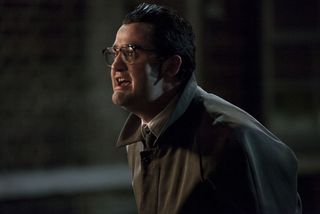
We hear Keats speaking to someone called ‘Dave’. I’ve already told you my theory that it’s David Bowie…
“You were right – he does say ‘Dave!’ It’s an ad lib! I thought ‘Nick’s right!’ I went back and looked at it. I thought ‘He was obviously pretty sure he heard the word Dave’, but I looked at the script and thought ‘There’s no Dave in here’. And then I watched it and he says Dave! The Devil’s called Dave! Keats is the Anti-Christ so he is on the phone to Satan. But that's just for my own amusement rather than something explicit.”
The Devil is David Bowie…
“The Devil must be David Bowie!”
Has Bowie ever been in touch with you about the show?
“Not with me personally. We got contacted by one of his legal people, but that was in response to us asking whether we could use Ashes To Ashes, that was all. Apparently it was all quite guarded – ‘David’s fine about that, he can see that the first show went well.’ So that’s all that I know. David believes the first show went well!”
And then you turned him into the Devil.
“Yeah, he’ll love us for that! [laughs] I don’t think he’ll mind…”
You have a clip from Dixon Of Dock Green right at the end of the episode. Dixon’s another character who was killed on screen and then resurrected. Is that reading too much into that choice of clip?
“No, no, that’s right. I liked the idea that Dixon died and came back. To start with it wasn’t that – it was only when I sat and thought about it that I realised there are actual parallels here. But originally what I was trying to do was touch on the timelessness of coppers. It was a ‘60s clip but it feels like a clip from Gene’s original time. It feels like it could be the ‘50s. It’s also the kind of copper that we all hope to meet. It embodies the ideal of policemen, experienced and wise and just. And it’s also just a charming little poetic indulgence as well! But then when I thought about it a bit more I thought well, actually, he died in The Blue Lamp, didn’t he? And then he emerged again… Maybe the whole of Dixon Of Dock Green was an afterlife!”
Maybe Z-Cars as well…
“Exactly! Softly Softly…”
Juliet Bravo…
“Every BBC cop show actually takes place in an alternate reality!”
So what part do pop songs play in this purgatory? You’ve got Keats talking about listening to Club Tropicana forever. Are they more than just a soundtrack?
“For us they’re dramatic devices – they’re good, easy ways of making you feel nostalgic or for injecting a bit of emotion. Certainly in episode 8 there was precious little room for pop music. Yes, Hell could be an eternal Club Tropicana. And that is the point of that joke. And then using Phil Collins’ In The Air Tonight… we originally had that laid much further over the whole sequence on the farm, but we realised that the longer you keep that track going the more you are desperately waiting for the ‘duh-dum-duh-dum-duh-dum’ with the drums kicking in! And it becomes an obssession! You don’t care about Alex or Gene or a scarecrow or anything else, you just care about when you’re going to hear those drums! And so we had to pull it right back. It’s been a bit harder with the music in this series. I think the drama has taken over and we haven’t needed the music so much in the last couple of episodes.”
But the songs themselves don’t play any deeper role in the cosmos that you’ve created?
“No, no. I don’t think so. Except I really do like to imagine that when we die we still get access to music. It would be pretty tedious if we didn’t.”
Alex has a memory of Gene holding her hand in the real world. How does that fit with the whole purgatory thing?
“I could come up with a very, very complicated answer to that question, but I would say it’s probably an orphan idea. When we originally had that idea at the end of series one, we obviously knew the big, metaphysical building block. I said ‘Look, when Alex was a kid, Gene was already long dead – in 1981 Gene had already been dead for almost 30 years’. So I don’t mind the idea that somehow she has this image in her mind of a guardian angel or a man that has held her hand. That was probably a different person, an actual copper, but now she’s remembered it as Gene Hunt, and maybe in some strange way that’s her premonition of Gene’s role as a guide and a guardian. It’s a symbolic truth. We thought about it at the time – should we do it, and do we need to tie it up, because it does imply proper time travel, or flitting between dimensions, which we certainly didn’t want to do. So we said ‘Look, it’s too nice, let’s just have it because it’s nice and it’s emotional. And then if we can find a way of building it into the mystery, brilliant. If we can’t then it’ll have to remain as a slightly orphan idea, for people to pick over for years to come.’”
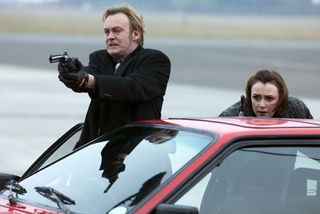
Is there a part of you that doesn’t actually want to explain too much?
“Yes, definitely. The only time the word ‘dead’ is used is when Shaz says ‘I’m wearing a dead woman’s clothes, it seems appropriate’. No one says ‘I’m dead’. No one says ‘So when I go through those doors I’m going to go to Heaven’. We don’t actually know that’s where they’re going, and they might be eternally sitting in the pub! It might be Nelson’s domain. Who knows? And we don’t really know where Gene’s going to end up. One of the fans sent me an email saying ‘Everyone’s telling me that everything’s going to be tied up at the end – please don’t tie everything up, leave us with something to invent for ourselves…’ And I thought that was a very wise thing to say, because you have to have those mysteries, don’t you? And also, just because people are operating on the cosmic plane doesn’t mean that they know everything. There’s no reason to assume that if there is another world beyond this that we’re going to know any more about the way the cosmos runs when we get there than we do now! So I felt like we could afford to keep some mystery. Some people will see that as laziness. I’m sure some people will say oh, they couldn’t be bothered to actually work it out. But what characters in what dramas really know everything that’s going on?”
You don’t want to tie that bow too neatly, then?
“I don’t think so, no. The important thing is that there’s some sort of emotional closure. I hope there is, anyway.”
Did you think about getting Sam back?
“Yeah, we talked about bringing Sam back. Partly we were worried about being a hostage to John [Simm] saying yes or no… We might have got a whole storyline around it and then he might have got cold feet. We also thought that bringing Sam back might undermine Alex, might undermine the whole of Ashes To Ashes. And of course he’s dead. And our logic has said ‘He’s gone into The Railway Arms and he’s presumably moved on to Heaven.’ What are we saying? That he can come out again? How does that work?”
He could have just nipped out for a fag…
“Yeah, because it’s bound to be non-smoking up there! [laughs] So in the end we thought we’d use Nelson. Because we did always want Nelson to be a spirit guide, a guardian, a keeper of the knowledge. And so it felt right that Nelson stepped out of the pub.”
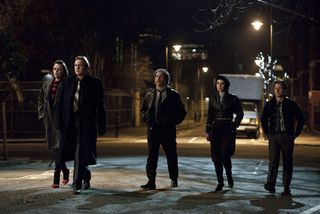
Do you think you’ll ever be tempted to revisit these characters or is this very much a full stop?
“In television terms it is definitely a full stop. I think… I should never say never. One day you’ll probably be reminding me of this! But in television terms, there is no sequel to Ashes To Ashes. I think it would be really hard to go on with Gene now. I suppose you could tell the story of Gene’s redemption, of how Gene finds peace and goes into the pub, but I’m not sure that would be as interesting, somehow. And the stories I’ve always loved from being a kid are stories that have left their central character with a burden to bear – not an ending where they all change, but an ending where someone is a constant in it. I totally lost interest in The Lord Of The Rings once they’d all got back home. I thought ‘I don’t care!’ And so that was why we left Gene there. Though there is a fake Ashley Pharoah document out there, written by him, but as a joke to upset the BBC, called The Laughing Gnome. And he says ‘We’ve got one more Bowie in us…’ He did the whole title page and copyrighted it and everything. It’s a series bible – but it’s all blank pages – and we landed it on a few desks for a bit of laugh…”
How did they react?
“They said ‘Yeah, it’s commissioned!’”
